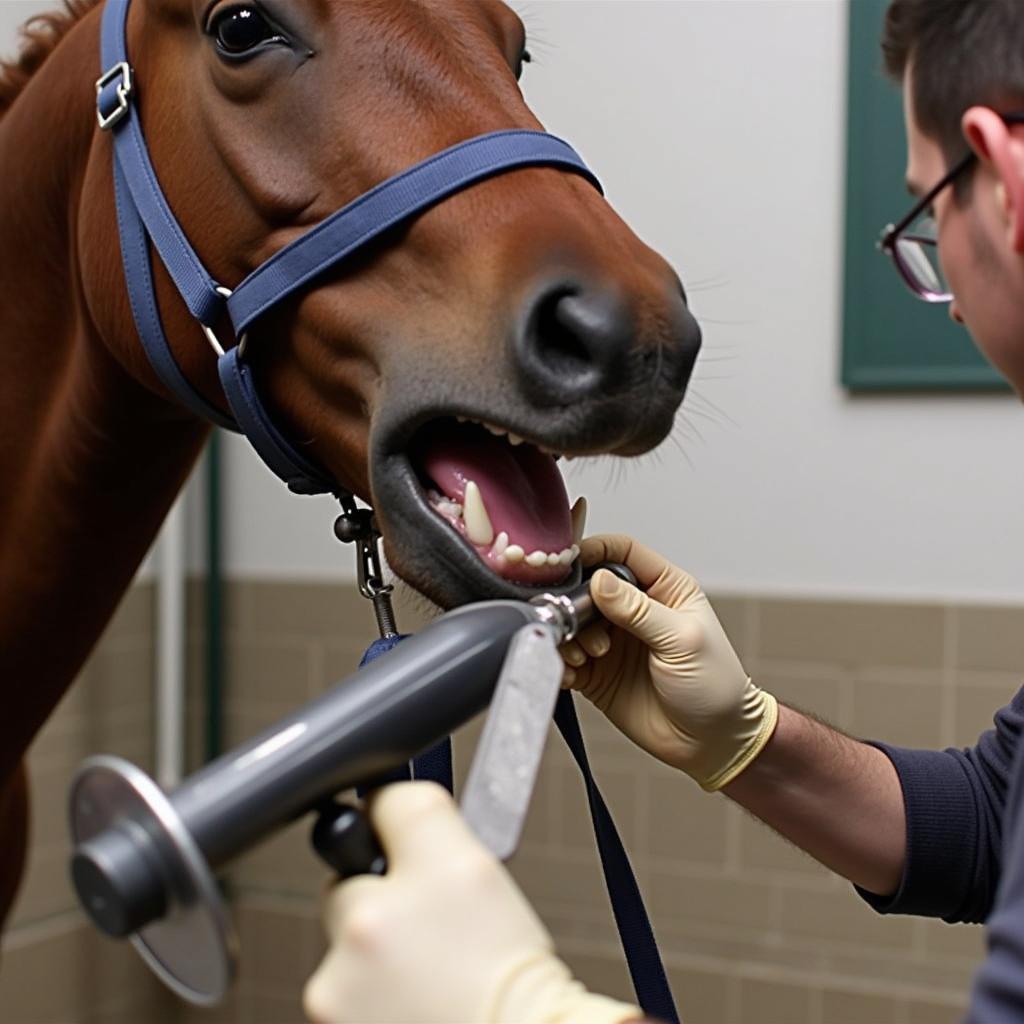Equine dental care, especially Float Teeth Horse procedures, is crucial for your horse’s overall health and well-being. Understanding why and when your horse needs their teeth floated can prevent serious dental issues down the line.
Horses’ teeth continuously grow throughout their lives. As they graze, the grinding action wears down their teeth, but this wear isn’t always even. Sharp points and hooks can develop, causing discomfort and affecting their ability to chew properly. This is where floating horse teeth comes in. floating horses teeth is a procedure performed by a veterinarian or equine dentist to file down these sharp edges, ensuring a comfortable bite and optimal digestive health.
Why is Floating Horses Teeth Important?
Floating a horse’s teeth isn’t just about comfort; it’s essential for their overall health. Sharp enamel points can cause ulcers and lacerations in the mouth, leading to difficulty chewing and even weight loss. Proper mastication is key for efficient digestion, and without it, your horse may not be able to extract all the necessary nutrients from their feed.
 Horse Teeth Floating Procedure
Horse Teeth Floating Procedure
Signs Your Horse Needs Their Teeth Floated
Recognizing the signs that your horse needs their teeth floated is crucial for early intervention. These signs can be subtle, so careful observation is key. Some common indicators include:
- Quidding: Dropping partially chewed food from the mouth.
- Weight loss: Difficulty chewing can lead to inadequate nutrient absorption.
- Excessive salivation: A sign of discomfort or difficulty swallowing.
- Head tilting or shaking: Attempts to find a comfortable chewing position.
- Resistance to the bit: Painful points can make it uncomfortable to wear a bridle.
How Much To Float a Horses Teeth and What to Expect
The cost of how much to float a horses teeth can vary depending on location and the complexity of the procedure. It’s best to consult with your veterinarian or equine dentist for an accurate estimate. The procedure itself involves using specialized tools, often power-driven, to file down the sharp edges of the teeth. Most horses require sedation for the procedure to ensure their comfort and safety.
Aftercare for Float Teeth Horse Procedures
After your horse’s teeth have been floated, there are a few things to keep in mind to ensure a smooth recovery. Offer soft feed for a few days to minimize discomfort. Monitor your horse for any signs of complications, such as excessive bleeding or swelling. Regular dental checkups, typically annually, are essential for maintaining good oral health.
“Regular dental care is an investment in your horse’s long-term health and well-being,” says Dr. Emily Carter, DVM, an equine dental specialist with over 20 years of experience. “Addressing dental issues early can prevent more serious problems down the line.”
Choosing the Right Equine Dentist
Selecting a qualified and experienced equine dentist or veterinarian is paramount for ensuring a successful float teeth horse procedure. Look for professionals with proper certifications and a good reputation within the equine community.
“A thorough dental examination is the first step in determining the appropriate course of treatment,” adds Dr. Carter. “A skilled practitioner will be able to identify any potential issues and recommend the best course of action for your horse.”
Conclusion
Float teeth horse procedures are a vital part of maintaining your horse’s health and well-being. Regular dental checkups and timely interventions can prevent discomfort and ensure your horse can chew and digest their food effectively. By understanding the importance of teeth floating horses and recognizing the signs of dental problems, you can help your horse live a longer, healthier, and more comfortable life.
FAQs
- How often should my horse’s teeth be floated?
- What are the risks associated with floating a horse’s teeth?
- Can I float my horse’s teeth myself?
- How long does a horse teeth floating procedure take?
- What should I feed my horse after their teeth have been floated?
- How can I find a qualified equine dentist in my area?
- What is the average horse teeth float cost?
Need more information about horse grooming? Check out our article on shedding comb for horses.
For any assistance, please contact us at Phone Number: 0772127271, Email: [email protected], or visit our address: QGM2+WX2, Vị Trung, Vị Thuỷ, Hậu Giang, Việt Nam. We have a 24/7 customer support team.